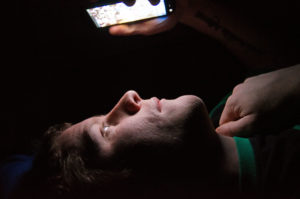Notícias
Durma bem, treine melhor!
Você está dormindo o suficiente? A recuperação é um componente essencial da manutenção e da otimização do desempenho cognitivo e físico durante e depois de um treino pesado.
Dormir/ descansar o suficiente é fundamental para a recuperação. Por exemplo, de acordo com o estudo de Simpson 2016, adolescentes que dormem menos de 8h/noite têm 1,7 vezes mais probabilidade de sofrer uma lesão significativa do que aqueles que dormem mais de 8h. Além disso, a velocidade e endurance musculares, a atenção e memória, risco de se lesionar, e manutenção do peso são negativamente afetados pelo sono insuficiente.

Porém, se o seu problema for conseguir dormir, verifique se está usando seu telefone celular, laptop ou tablet até muito tarde. No estudo de Figueiro 2013 mostra que a luz emitida por esses dispositivos altera o chamado ritmo circadiano (ou ritmo do sono), reduzindo em até 22% a produção de Melotonina. “Produzimos melatonina no escuro. Esse hormônio diz ao nosso corpo quando é hora de desacelerar e ir dormir”, diz Mariana Figueiro. Logo, reduza o brilho do eletrônico ao nível mais baixo. Use o aparelho o mais distante do rosto possível para reduzir a luz na retina e opte pelo fundo preto com letras brancas [como no caso do eBook, leitor de livros da Apple].
Em suma, menos horas de sono aumenta a possibilidade de fadiga, baixo consumo de energia e baixo foco durante a partida. Além de retardar a recuperação pós jogo. Independente se você pratica esporte profissional ou amador, é necessária uma quantidade adequada e de qualidade de sono para mostrar seu melhor jogo.
Resumo:
Luz de 📱antes 💤 = ⬇️melatonina e baixa qualidade do Sono & Fatiga
Conclusão: 📵 antes 💤
Referências Bibliográficas:
- Simpson,N.S., Gibbs,E.L. and Matheson,G.O. Optimizing sleep to maximize performance: implications and recommendations for elite athletes.Scandinavian Journal of Medicine & Science in Sports 2016.
- Wood B, Rea MS, Plitnick B, Figueiro MG. Light level and duration of exposure determine the impact of self-luminous tablets on melatonin suppression. Applied Ergonomics 2013.
Sleep well, train better!
Are you sleeping enough? Recovery is an essential component of maintaining and optimizing cognitive and physical performance during and after demanding training. Getting sufficient amounts of rest and sleep is key to recovery. For example, adolescents sleeping less than 8 h/night were found to be 1.7 times more likely to experience a significant injury than those who slept more than 8 h. Speed and endurance, attention and memory, and illness and injury risk, and weight maintenance have all been shown to be negatively affected by insufficient sleep. In short, less sleep increases the possibility of fatigue, low energy, and poor focus at game time. It may also slow recovery post-game. Whether you’re playing for professional or amateur sports, getting the proper amount of sleep is necessary to be at your A game.
However, if your problem is actually sleep, make sure you are not using your cell phone, laptop, or tablet too close to your sleep time. Figueiro’s study in 2013 shows that the light emitted by these devices changes the so-called circadian rhythm (or sleep rhythm), reducing by up to 22% the production of Melotonina. “We produce melatonin in the dark. This hormone tells our body when it’s time to slow down and go to sleep,” says Mariana Figueiro. So to solve that issue, you should reduce the brightness of the electronic to the lowest level. Use the device as far away from the face as possible to reduce the light on the retina and opt for the black background with white letters [as in the case of the eBook, Apple Book Reader] our avoid their use close to your bed time.
Light from 📱before 💤 = ⬇️melatonin and Poor sleep quality & Fatigue
Conclusion: 📵 before 💤
